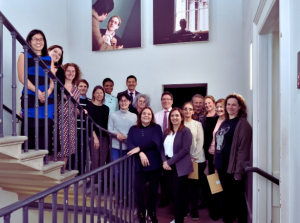Far and away the most important relationship during your PhD is with your primary supervisor.
Many successful academics were launched into their careers by a fantastic supervisor. However, it’s not a given that everything runs smoothly.
We know how important good supervision is and are part of a UK-wide project to develop the very best continuing professional development for research supervisors.
Having worked with numerous PhD students and supervisors in various guises since I finished my own PhD in 2003/4, here are my top 10 tips for getting the best from your supervisory relationship.
1. Discuss expectations and agree ways of working early on
It’s not a given that a student and supervisor’s expectations of how to work effectively together will match. You might be fortunate, but don’t make assumptions. Ideally in your first few supervisory meetings you should discuss how you’re going to work together and what you can expect of each other.
Your faculty should have a template document to guide you and your supervisor in this conversation. You can also download our template to get you started. If you didn’t have that conversation at the start, don’t worry, have it now!
2. Review ways of working regularly
It’s also important to revisit the expectations conversation every now and then. As you progress in your PhD, your needs will change and the support your supervisor provides will likely change too. So revisit that conversation.
3. Remember your supervisor isn’t perfect!
It sounds obvious, but some students definitely have an unrealistic view of their supervisor. Remember they are human and likely have many other draws on their time, whether other students or other responsibilities, at work and at home. Be careful of slipping into bad habits – submitting work at the last minute and expecting a speedy response, for example.
4. Ask for help when you need it
Most PhD students are highly successful, hard-working people, used to getting top grades. Seriously! That’s you! As such, a PhD can be a challenge. You’re (suddenly) expected to be self-directed and you may come up against all sorts of issues. Your ideas are critiqued and pulled apart. Seemingly fruitful avenues of enquiry turn out to be dead ends. Experiments don’t work, archives don’t yield the information and insights you hoped for, fieldwork takes twice as long to plan as you’d imagined! Something happens in your personal life. You’ll need help. It’s normal.
5. If there are problems then raise them, don’t let them fester
Just ask for help sooner rather than later! There’s no shame in it. You’ll probably address the problems more quickly if you nip them in the bud. We’ve all been there, I can assure you.
There are lots of routes you can go depending on the issue:
- Is there a PGR officer in your dept? Someone in Professional Services who can help with practice things.
- Maybe you need to speak to your academic PGR Coordinator.
- There may be confidential advisors or personal tutors, depending on your faculty.
- There is also the Associate Dean for Doctoral Studies, your faculty PGR lead.
- And there is lots of support through Student Services – for mental health and wellbeing, counselling, money & housing advice and more
- Our PGR Wellbeing Hub has all the links and information com/pgrwh
6. Make use of your second supervisor
I hope you know who your second supervisor is! There’s no one shape for what a second supervisor can offer. Just make use of them. Have regular meetings even if they’re not that frequent. They might be a sounding board for new ideas. They might have a specific skill/interest/expertise that will enrich your research/thesis. They might be very experienced and therefore be a fount of knowledge or provide access to networks. Like I say, there’s no one type.
7. Manage upwards
If you’re not getting what you need from your supervisor then you may need to be more assertive. We can help you with that… book for our workshop
Getting the Best from your Supervisor (PGR324)
This course will help you to understand your supervisor’s perspective and expectations and will highlight areas for autonomy and supervision throughout a doctoral journey. Learn how to be assertive and persuasive in the way that you communicate with your supervisors to achieve mutually beneficial outcomes.
8. Celebrate your supervisor if they’re doing a good job!
A lot of supervisors put a lot of time and energy into supervision. If that’s your supervisor then I can assure you that a kind word of thanks goes a long way.
If your supervisor really is excellent then you might like to nominate them for one of our Supervisory Excellence Awards.
9. Remember it’s your PhD!
I’m probably speaking more to scientists and lab-based researchers here but fundamentally the PhD is yours! In some disciplines your supervisor may play a very close guiding role, especially the start, but don’t let that lull you into a false sense of dependence. You will have to defend your thesis in the final exam. So don’t be afraid to try things you think are important and to discuss options robustly with your supervisor(s). As you progress in your research you should be becoming an expert, so don’t give way to critique too quickly.
In other disciplines, you may be only too aware that it’s your PhD! So…
10. Draw on as many sources of wisdom and support as you can
It can be easy to get stuck in a rut. So don’t!
Seek out other sources of support, find a mentor or two. Attend seminars in other related departments. Approach other researchers and academics. Make the most of being at a comprehensive research-intensive institution. Time spent thinking about bigger issues, the broader research context is rarely wasted and may yield information, stimulate new ideas and help you move forward.
I wish you all the very best in your doctoral research.


